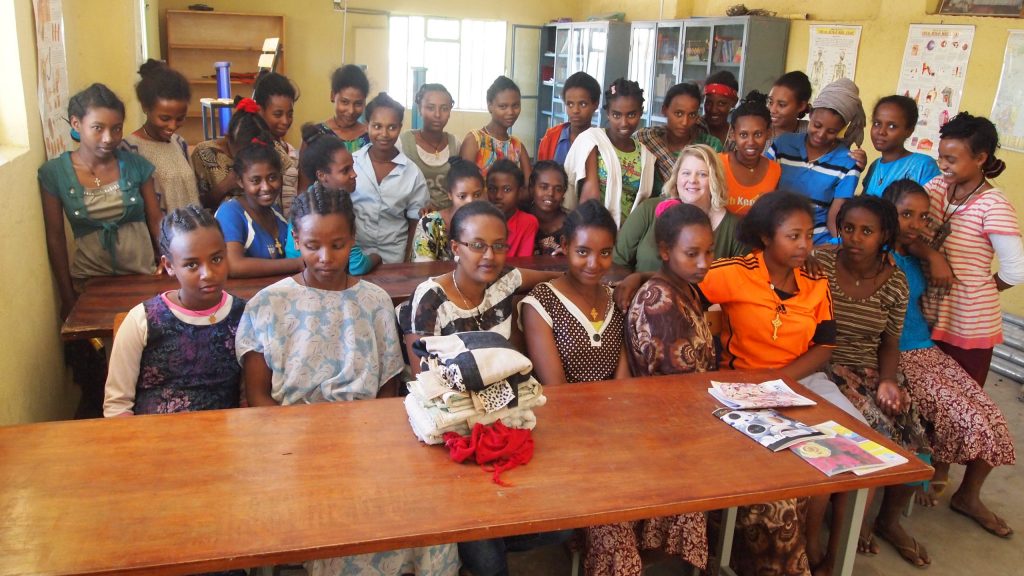Engaging African Youth In Agriculture
Youth need agriculture, and agriculture needs youth. To figure out how to attract youth to the sector, the Feed the Future Innovation Lab for Food Policy is asking all the right questions.
Read MoreEmpowering Orphaned Girls to Become Community Leaders
A volunteer in Ethiopia empowers orphaned girls and prepares them for successful futures.
While religious service is the primary focus of the Melka Abune Aregawi Nunnery near Dire Dawa, eastern Ethiopia, the nuns also play a significant role in their community, running various welfare services including small-scale agriculture and environment protection activities. The nunnery’s main income source is from its farm, where the women lead crop production, such as fruits and vegetable, dairy farming and bee keeping. The nuns also provide a home for and mentor more than 115 orphaned girls, who have lost their families to HIV/AIDS, civil wars, displacement, famines, and other social problems.
The nunnery provides the girls with food, shelter, clothing, basic education and skills training to empower them to become productive citizens in the future. However, these youth often face more socio-economic and psychological challenges than their peers, and need additional training and guidance to prepare them for successful futures.
Enter Carmen Benson-Byce — a volunteer with Farmer-to-Farmer (F2F), a program that leverages U.S. volunteers’ agricultural expertise to help respond to local needs. Benson-Byce traveled to Ethiopia in 2015 and worked with 42 girls and three nuns to help them build necessary skills and find their inner confidence to help them reach their full potential.

Benson-Byce primarily focused on life skills including communication, confidence, conflict resolution, and the development of a peer mentoring program that builds on technical agricultural training of past volunteers. The girls enjoyed opportunities to work in small groups and to share their learnings through song and drama skits.
“Observing the resilience of the girls I had the privilege of learning with and teaching in Dire Dawa was an amazing experience,” Benson-Byce said. “These girls, at ages 5–18, have conquered challenges many cannot even imagine: loss of parents, sexual exploitation and abandonment.”
Benson-Byce began her career as a middle and high school agriscience teacher and Future Farmers of America advisor. With this career base and other professional and volunteer experiences in agriculture education, Benson-Byce implemented the three-component model of agricultural education taught in the United States, combining classroom and laboratory learning, experimental and service learning, and leadership development.
Recognizing the need to build resilience and self-efficacy among the girls, Benson-Byce assisted them in crafting personal goals and action plans related to education, professional development, family life and personal health. Many girls prepared plans to seek post-high school education in agriculture or health and nutrition, while others planned to return to their home villages to improve their family livelihoods with improved agricultural technologies and practices. Along the way, Benson-Byce continuously encouraged them to become confident, competitive and strong community leaders, paving the way for them to serve as role models to other young girls in the future.

“There is real strength in the love they showed for each other — the way the older girls guided and mentored the younger girls, and their easy, heartfelt laughs during the many games and activities we shared,” Benson-Byce said. “I witnessed girls who were completely closed off from their peers and disengaged from activities at the start of the program, evolve into confident and charismatic class leaders by the end of the program.”
Farmer-to-Farmer supports farmers and agribusiness professionals in developing countries to improve their livelihoods and food security. The program sends volunteers from the U.S. on need-based assignments to provide hands-on training and mentorship to communities, agricultural cooperatives, agribusinesses, and educational institutions.